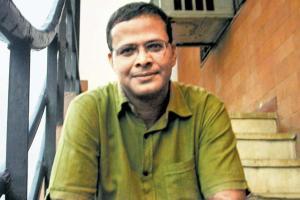Ahead of his talk, Translating Mumbai, award-winning writer Jerry Pinto on the many tongues the city speaks in

Jerry Pinto
What led to the Bambaiya-fication, so to speak, of the city's languages?
I think in some ways this city is the city of can-do. Whenever I travel outside the city in India, someone will say to me, slightly defensively, 'This is not Bombay, you know, things are slower here.' I think the city promotes a culture of trying harder. And this spills over into language as well. We all work towards being understood; there is pride in language, yes, but there is also a spirit of trying to communicate.
ADVERTISEMENT
This has constructed the patois of Bambaiyya with words from many other tongues, using a metaphor like Devdas (Bengali literature), or rehashing a pronunciation like zimbly (English via Malayalam), adopting a word like pao (Portuguese via Konkani), khallas (Arabic via Marathi)…The great precedent for this of course was Urdu, which developed as a language for the soldiers of Akbar's army to talk to each other.
How is this natural, happy mingling of languages impacted when they are misused for political reasons?
Language is a life form; language is life force. Language must be organic, must grow naturally, must grow in the use of it. When language is force-grown, you get strange artificial life forms that cannot live outside the laboratory. This is the cold language of the bureaucrat, this is the language of high academia. It is bad for all of us when there is an agenda in the meddling; otherwise we are all misusing language for our own ends. We've only just begun paying attention to our own languages and their histories, but it's good that we've made a beginning.
Could you share with us some of your memories of growing up in a multilingual Bombay?
My memories of Hindi are all based on Bollywood. My memories of Marathi are as the white noise of Mahim. My memories of language teaching in school are simply the terror of getting the samuchhaybodhak right. I remember going to church for Konkani Mass and the shock of the unfamiliar sounds, but being able to manage because I could feel the rhythms of the prayers under the words. I remember my grandmother teaching me a little verse in Burmese (I wish I could remember it now) and my mother singing Portuguese lullabies to me. I remember the doctor speaking Gujarati to my father.
I remember a friend in college teaching me 'Asatoma sat gamayya' and another friend teaching me the Mahamrutyunjaya and the delight in those new rhythms, new for me, old as the country. I remember Narayan Surve singing a poem and I remember Gieve Patel biting the words of his poems. I could go on like this forever.
Log on to: globalcenters.columbia.edu/mumbai (talk to be uploaded online post July 4)
Catch up on all the latest Mumbai news, crime news, current affairs, and also a complete guide on Mumbai from food to things to do and events across the city here. Also download the new mid-day Android and iOS apps to get latest updates
 Subscribe today by clicking the link and stay updated with the latest news!" Click here!
Subscribe today by clicking the link and stay updated with the latest news!" Click here!






